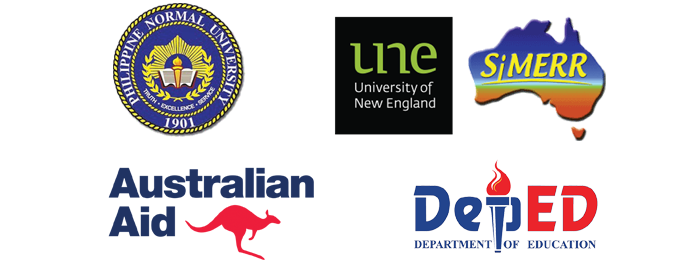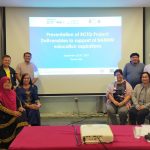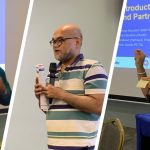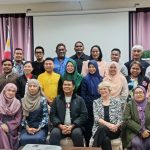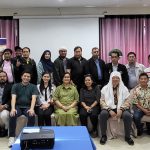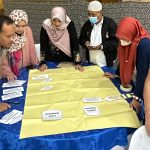MBHTE, TEIs learn about learning progression
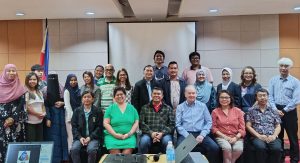
Participants of the workshop on learning progression with Dr. John Pegg, RCTQ Director Dr. Jennie Jocson, and MBHTE-Higher Ed Director General Marjuni Maddi.
RCTQ introduced the concept of learning progression to senior staff of the Ministry of Basic, Higher and Technical Education (MBHTE) and partner teacher education institutions (TEIs) in a workshop conducted on 11-13 July 2023 in Davao City.
Dr. John Pegg, RCTQ Co-Director and Director of RCTQ’s research partner, the SiMERR National Research Centre at the University of New England Australia, conducted the activity, which enabled participants to learn ways of supporting learners as they progress through a sequence of interconnected and hierarchical steps in the learning process.
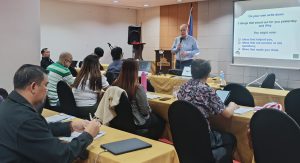
DG Marjuni Maddi (left) attends one of the sessions on learning progression facilitated by Dr. John Pegg.
Ministry of Basic, Higher and Technical Education (MBHTE) Director General for Higher Education Marjuni Maddi also attended the workshop.
Learning progression is based on understanding learning as a continuous and developmental process. It guides educators in supporting students’ learning, ensuring a more structured and effective educational experience.
“Learning progression focuses on students’ learning, instead of teachers’ teaching.” Dr. Pegg said. “It is a way of the future.”
Rowel Dumanglas, Education Program Specialist at the MBHTE Higher Education, said the workshop inspired him to think of ways “to address the learning gaps, and the teaching and learning challenges in the BARMM by developing initiatives to operationalize learning progression.”
“I want to disseminate the importance of learning progression among policy makers in BARMM as well as the school administrators, down to the curricular administrators and faculty. I believe this will help us produce more competent professional teachers in the future,” Mr. Dumanglas said.
Dr. Darrem B. Datiles, full-time faculty member and former vice president for academic affairs of Notre Dame of Jolo College, shared that the workshop taught him how “teacher should start with where the learner’s knowledge is.”
“I have learned much about valuing errors by students. Teachers gain valuable information from students’ errors, and error tolerance encourages students’ active involvement in the class. For us, faculty members and teachers, there are times that we ignore errors because we want things to be perfect. But I learned from this workshop that it is in fact more helpful to allow learners to commit errors. It is a way to learn more,” said Dr. Datiles.
“When we do away with the traditional way of teaching which is teacher-focused, we can help our students make academic progress according to their own paces. In this way, we can produce better teachers of the future,” Dr. Datiles added.
“Educators should create an environment that celebrates and supports the learning process, including the occurrence of errors. Constructive feedback, guidance, and encouragement play a crucial role in helping students learn from their mistakes and progress in their educational journey,” Dr. Pegg said.
Dr. Pegg also introduced what he called micro learning progression, which utilizes the Structure of the Observed Learning Outcome (SOLO) taxonomy in assessing and tracking students’ progress along the learning progression.
The workshop was part of the continuing engagement of RCTQ and UNE SiMERR with the Education Pathways to Peace in Mindanao (Pathways) program, an education initiative supported by the Australian government in partnership with the Bangsamoro government. (RCTQ Comms)
https://www.rctq.ph/?p=4507NewsLearning Progression,MBHTE,Pathways program,SOLO

